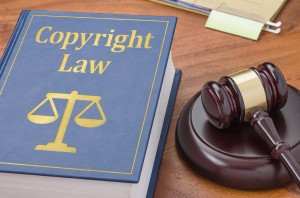CASE In Fact: Small-Claims Copyright Court Conundrums (Part II)
This legislation has a lot of problems. Will it actually help copyright holders?
 Last week, we established the landscape into which the government has now waded with the introduction of the CASE Act. This bit of proposed legislation would amend the Copyright Act to establish the Copyright Claims Board (CCB), which would hear and decide smaller-scale copyright disputes. The proceedings, which will carry damages caps, are intended to provide copyright holders with a lower-cost alternative to lengthy federal court litigation.
Last week, we established the landscape into which the government has now waded with the introduction of the CASE Act. This bit of proposed legislation would amend the Copyright Act to establish the Copyright Claims Board (CCB), which would hear and decide smaller-scale copyright disputes. The proceedings, which will carry damages caps, are intended to provide copyright holders with a lower-cost alternative to lengthy federal court litigation.
If everything goes according to plan and all participants — from the independent artists to the mega-corps and all those in-between — operate in good faith, this new system should greatly reduce the cost of enforcing one’s copyrights, mitigate the burdens of litigation, and lighten the caseload of the federal courts. And, hopefully, it will result in more content creators bringing viable claims of infringement and would-be copyright infringers reconsidering their decision to infringe in light of the potential remedies and this sleek new enforcement mechanism.
Looking at the language of the proposed amendment, though, makes clear that the proposed legislation has a whole slew of potential problems. As is the deal with much well-meaning legislation, there are fundamental flaws in the current text that will remove the teeth from, if not disembowel entirely, the proposed low-cost tribunal for copyright claims.

Is The Future Of Law Distributed? Lessons From The Tech Adoption Curve
First, the proposed amendment has one major, glaring hitch that will render the proposed small-claims court a near nullity before the would-be litigants even darken its doors. Actually, it is the ability to compel that door-darkening that is the issue, as the current text does not include any obligation or requirement that one or all of the participants in a copyright dispute take part in the CCB proceedings. The proposed statute notes that participation in a CCB proceeding is entirely voluntary and nothing in the new law would preclude any of the interested parties from heading straight to the federal courts.
To wit, the language has an express “opt-out” provision for infringement defendants: if they provide notice to the copyright holder that they are opting out within 30 days of small-claims court service, the parties will be forced to litigate in federal court. The most likely effect of this opt-out is that in any case where the defendant is a corporation with ample resources and the plaintiff is an artist lacking in resources (which will often be the case given that the matter was filed with the CCB in the first place), the defendant will most likely opt out and force the artist to spend the time and money to litigate in federal court.
Ironically, the establishment of the CCB Court and subsequent attempts by artists to engage in its small-claims proceedings may result in the perverse and unintended consequences of actually increasing costs for those artists pursuing defendants who opt out, as the initiating copyright infringement claim documents will have to be drafted twice — once for the small claims court and then again for federal court. And, the prosecution of the infringement will be delayed while this 30-day opt-out period runs. So, the very cases that the CCB was intended to make easier, quicker, and more cost-effective to resolve will instead take longer and cost more in many instances.
Another provision that acts to disincentivize artists from taking part in the CCB courts is the damages caps that cabin the available relief. The caps — $15,000.00 per infringement and $30,000.00 per small claims case — are a fraction of the statutory maximum for willful infringement under the Copyright Act. Many copyright infringement cases are willful — meaning that the infringer knew it was infringing, or recklessly disregarded the possibility that it was infringing — and in the federal courts the range of damages available to a registration holder for willful infringement is $30,000.00 – $150,000.00 (and even this upper limit is far too low given that many acts of willful infringement result in millions of dollars in ill-gotten revenues, but that’s another issue for another day). Since the new small-claims court will cap damages at a miserly one-half of the low end of the pre-existing willful infringement damages range, it would be disadvantageous to copyright holders with willful claims and timely registrations to proceed in small-claims court.
Sponsored

Generative AI In Legal Work — What’s Fact And What’s Fiction?


Is The Future Of Law Distributed? Lessons From The Tech Adoption Curve

Legal AI: 3 Steps Law Firms Should Take Now

Navigating Financial Success by Avoiding Common Pitfalls and Maximizing Firm Performance
Similarly, parties to a small claims action are precluded from recovering the costs and attorneys’ fees incurred in connection with most proceedings. This preclusion is also limiting, because an artist prevailing on a copyright claim in federal court is empowered to recover her costs and fees in doing so, so long as she has a timely registration for the work at issue (which is required, for some reason, for an artist to recover such costs and fees). In any event, removing entirely the specter of an infringer having to pay the artists’ fees reduces the artist’s leverage and, most likely, their inclination to participate in the CCB courts.
One bright spot, in a practical sense, and the provision with the most apparent utility, is the default proceedings established by the CCB. Many small copyright claims end up with the defendant defaulting, and it is expensive to obtain a default judgment in federal court. The process in small-claims is faster and cheaper and will provide a real benefit, especially to those whose works are habitually ripped off.
And there are certainly ways to mitigate some of the problematic provisions detailed above. One would be to require the parties to a smaller copyright infringement case to address the matter in small-claims court. Or, allowing a litigant to make a motion in cases removed to federal court to “remand” the case to small claims under appropriate circumstances. It would also be beneficial if the federal court judges who presided over smaller-scale cases that were removed from small-claims court were empowered to ascertain whether the removing party participated in good faith in so removing, and then employ this degree of participation as a factor when deciding the amount of statutory damages or attorneys fees to award to the prevailing party under the Copyright Act.
As currently written, the CASE Act, while a small step in the right direction, is not yet ready to go big in assisting copyright holders with efficient claim resolution.
Sponsored

The Business Case For AI At Your Law Firm


Navigating Financial Success by Avoiding Common Pitfalls and Maximizing Firm Performance
 Scott Alan Burroughs, Esq. practices with Doniger / Burroughs, an art law firm based in Venice, California. He represents artists and content creators of all stripes and writes and speaks regularly on copyright issues. He can be reached at scott@copyrightLA.com, and you can follow his law firm on Instagram: @veniceartlaw.
Scott Alan Burroughs, Esq. practices with Doniger / Burroughs, an art law firm based in Venice, California. He represents artists and content creators of all stripes and writes and speaks regularly on copyright issues. He can be reached at scott@copyrightLA.com, and you can follow his law firm on Instagram: @veniceartlaw.







